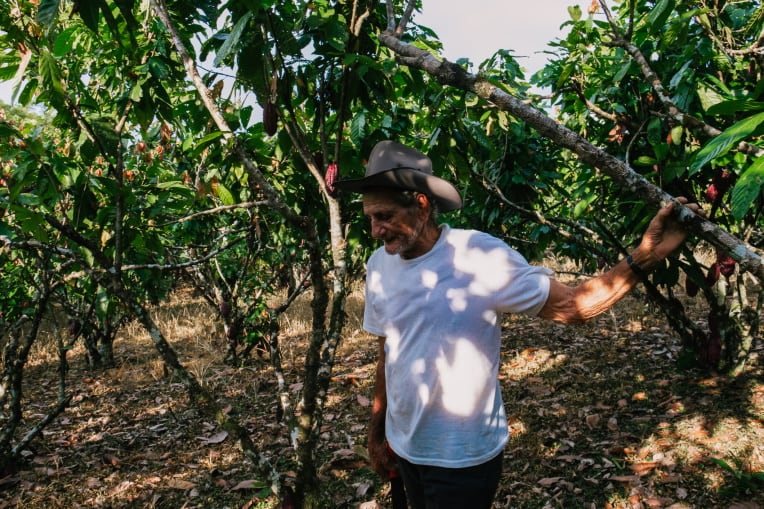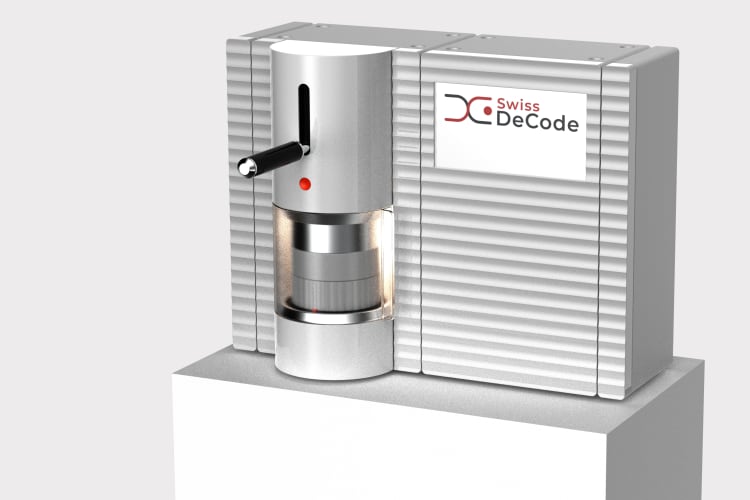Cocoa Swollen Shoot Disease (CSSD) is a serious issue in the cocoa industry. Several strains exist and it can cause defoliation, die-back and severe yield losses.
Cocoa trees affected by CSSD can be asymptomatic for up to two years, but then start to show symptoms such as red leaf veins or swollen stems and roots. Typically, infected trees die within 3-4 years of symptom development. Sick trees cannot be cured. The disease can only be managed by preventing further spread to healthy trees, for example by planting barrier crops or cutting out infected trees entirely.
CSSD is prevalent in West African countries including Benin, Côte d’Ivoire, Liberia, Nigeria, Sierra Leone, Togo and Ghana, where it was first detected in 1936. Across Ghana and Côte d’Ivoire over 780,000 hectares of cocoa trees are believed to be infected, according to Mars Wrigles and SwissDeCode. Currently, around 14 million cocoa farming families are impacted by the disease, SwissDeCode CEO and co-founder Brij Sahi noted.
“We have been looking for reliable preventive solutions against CSSD since the 1940s, as each year cocoa farms are being increasingly affected by this virus,” Jean-Philippe Marelli, Senior Director Integrated Pest Management at Mars Wrigley, observed.
Early detection to stem the spread of CSSD
Up until now, no efficient methods to quickly detect the presence of the virus in field had been found. A collaboration between SwissDeCode and Mars Wrigley is changing this.
SwissDeCode has leveraged its expertise in food authentication and DNA detection solutions alongside Mars Wrigley’s crop science insight to understand the specific issues and requirements of end users, from cocoa farmers to trading organizations.
The partnership has resulted in the creation of an on-site test that can detect the virus in less than 60 minutes. Built on SwissDeCode's DNAFoil proprietary technology, and incorporating underlying research from Mars Wrigley, the new solution is an ‘easy-to-perform’ testing kit that enables field personnel to test cocoa trees using their leaves as samples.
The test would allow farmers to detect infected trees before they show any symptoms. Swift action to prevent the spread of the virus to healthy trees can help cocoa farms limit the impact of CSSD. Cocoa tree nurseries could also use the test to monitor tree health and ensure planting materials are released only if they are free of the virus.
Containing spread of the disease helps to safeguard farmer livelihoods and future cocoa supplies. Leveraging the testing tech to replant infected areas and regenerate farms would not only boost yields – it would also reduce the risk of further deforestation, SwissDeCode suggested.
“We are making cocoa farming more sustainable, by preventing large-scale deforestation caused by recurring infections,” Sahi claimed.
Moving from test to scale rollout
Field validations of the test are now under way. “For years, governments, industry and other organizations have been actively engaged in fighting the spread of CSSD. Currently, Mars and SwissDeCode are working with extension agencies to validate the tool, conduct focus groups, and identify the most effective ways to make the tool accessible for farmers,” Marelli told FoodNavigator.
Mars Wrigley hopes to support widespread access to the testing tool for farmers throughout West Africa, the pest management specialist continued. “Our goal is to make the tool widely accessible for use in cocoa farms and nurseries in West Africa, so we will be working with key industry and institutional stakeholders to best scale the availability and the right use of the tool.”
“Once field validation is complete, which we anticipate will be done by the end of the calendar year (2021), the tool will be commercially available to all farmers and institutions interested in using and deploying it. The test will be manufactured and provided by SwissDeCode,” Sahi added.




